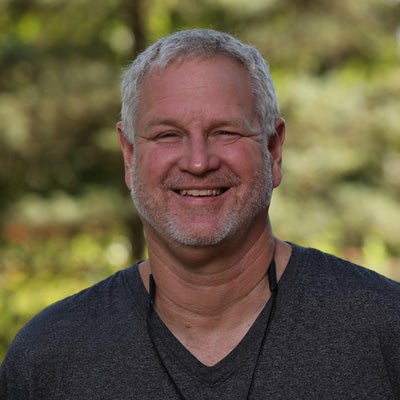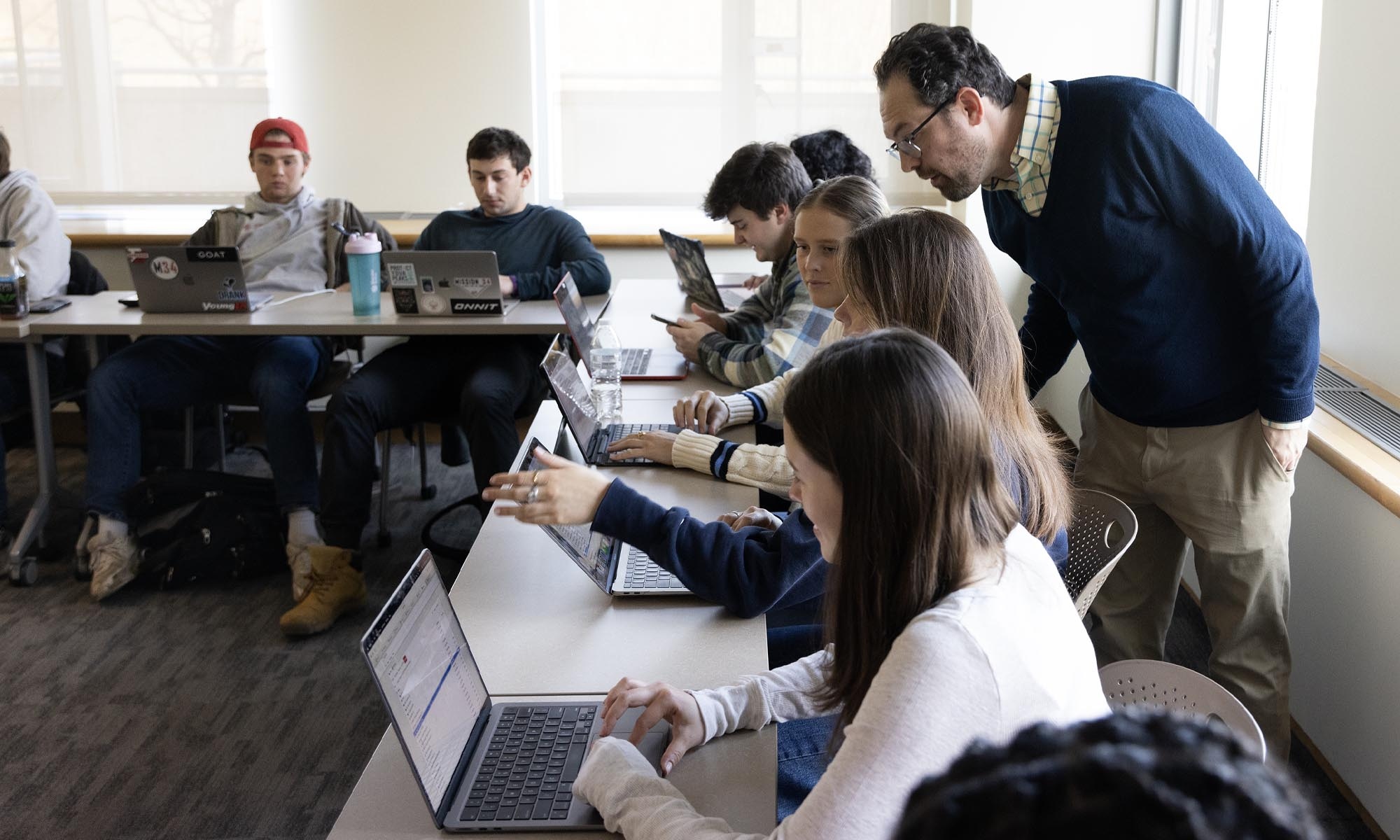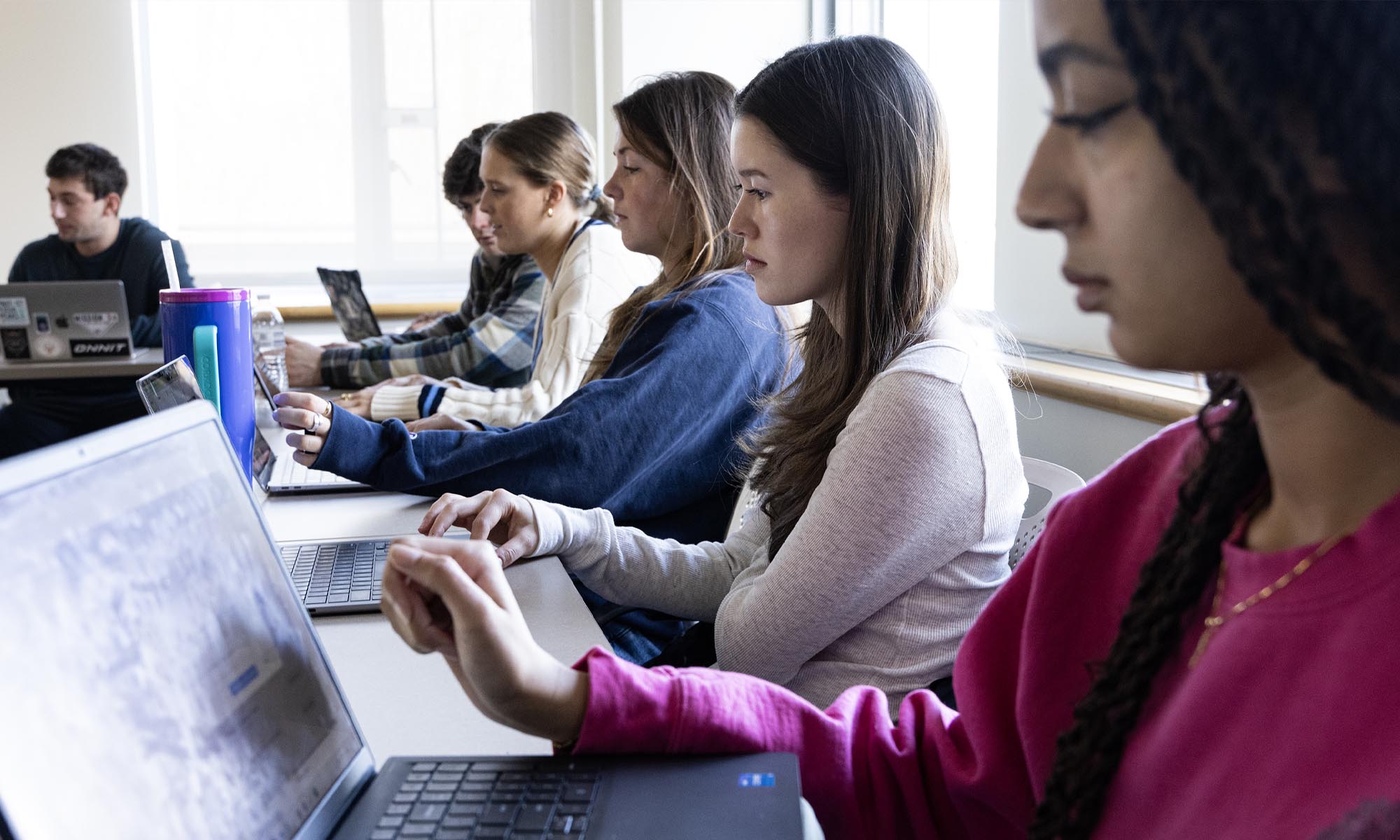We asked an AI large language model to highlight the most compelling or crucial points in Tom’s article.
Those sections are in this font style.
Professor Matt Kretchmar arrived at Denison in 1999, two years after IBM’s Deep Blue became the first computer system to defeat a reigning world chess champion. Kretchmar, who teaches mathematics and computer science, specializes in artificial intelligence, which powered Deep Blue.
Consumers have welcomed AI-driven digital assistants like Siri and appreciated the convenience of Roombas and their lawn-mowing cousins that trim the Denison intramural fields.
But it wasn’t until recently the public grasped the enormous capabilities of a technology that had been building momentum since the 1950s. The commercial release of generative AI, a subset of artificial intelligence that creates new content like text, images, video, and code based on patterns it learns from massive datasets, has everyone’s attention.
Businesses of all sizes see the opportunity advanced automation presents, and its potential to eliminate jobs but create new ones for AI-savvy job candidates.
The responsibility of educating students about the technology falls to colleges and universities, and Denison faculty members like Kretchmar understand the importance of the task.
“This will probably be the most definitive change I’ll have to make as an educator,” Kretchmar said. “It will force me to rethink fundamentally not just how I teach, but what I teach and what’s relevant for our students.”
In a recent survey of first-year Denison students, 90 percent said they wanted to learn more about generative AI.
The renovation and expansion of Doane Hall as a new data science center demonstrates Denison’s commitment to meet the challenge.
“Our mission hasn’t changed,” said Liv Gjestvang, vice president and chief information officer. “We are committed to cultivating independent thinkers, ethical leaders, and engaged citizens who graduate from Denison ready to navigate and lead in a modern world. AI should be a complement to and not a replacement for the critical thinking and intellectual curiosity that have always defined Denison. There are times when AI can accelerate and deepen learning and times when the best learning happens without it.”
Ethical and moral questions surround artificial intelligence, but faculty members tout the benefits for Denison students. Lori Robbins, an instructional technologist and AI lead, draws a parallel to the day she and her husband rode up Presidents’ Drive — one on a standard bike, the other on an electric bike.
“I was huffing and puffing, and my husband was going up effortlessly,” Robbins recalled. “AI is like using an eBike. You’re still in control, and you still have to pedal and watch out for cars, but it will help you get up hills easier.”
In the classroom
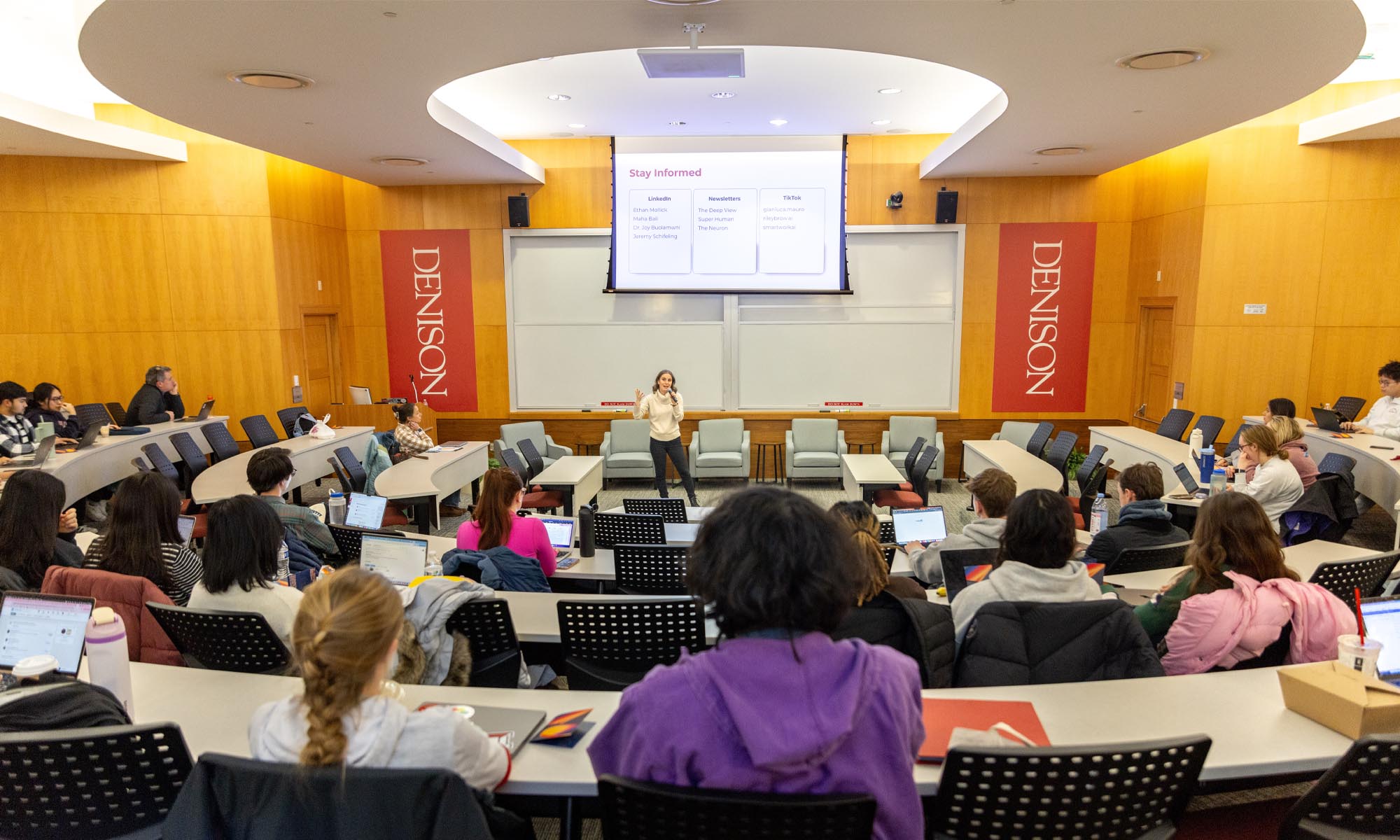
For decades, the majority of work with artificial intelligence on college campuses was done in math, computer science, and data analytics departments.
But as AI advances across society, Denison is readying students from all academic backgrounds. The World Economic Forum estimates that 70 percent of skills used in most jobs will change by 2030, with AI serving as the catalyst.
Faculty members have integrated AI strategies into: anthropology, communication, digital humanities, education, modern languages, politics and public affairs, queer studies, and English, among other programs.
In the past year, Robbins has seen a dramatic increase in faculty requests for in-class tutorials on AI research and prompting. Sometimes, these are tied to assignments.
Associate professor Melissa Huerta utilized AI to transform a Spanish class project, requiring her students to create a Spanish-speaking character. Students used the technology throughout the process to brainstorm backstories and generate visuals and narratives.
Associate professor Malliga Och asked students in her politics and public affairs class to use an AI chatbot to generate essays on course material and evaluate them for accuracy, depth, nuance, and supporting evidence. Students still needed to incorporate class readings and notes in the assignment.
“Part of the exercise is to show them the limitations of AI,” Och said. “They can’t just copy and paste and expect to get an excellent grade. They have to actually work with the output.”
Kretchmar and associate professor of philosophy Mark Moeller collaborated to teach a new course, “AI Basics and Big Questions,” drawing students from across the academic spectrum.
The goal was to teach students how this disruptive technology is changing the world, and delve into the ethical questions involved with it.
“I’ve found myself talking a lot about the class to my friends and family because it’s both incredibly interesting and lays a great foundation as to how we should understand AI both functionally and ethically,” Alexandra Redrick ’25 said. “I’ve also found myself using what I’m learning in class to kick start a lot of conversations for fun.”
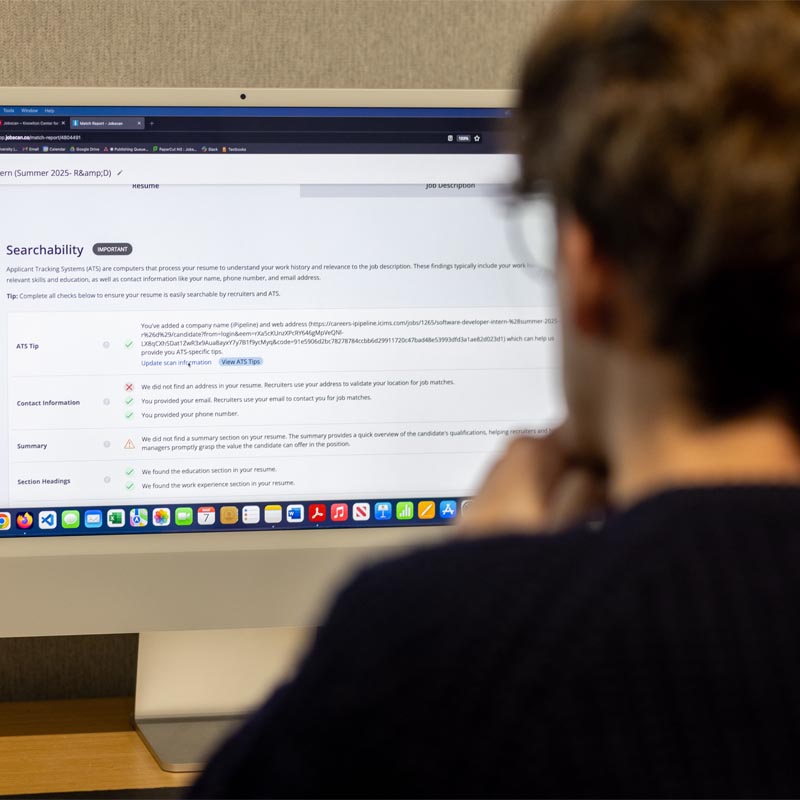
Career Workshops
As a computer science major, Andrew McCutchan ’26 is familiar with artificial intelligence, but until recently rarely used it to create resumes and write cover letters.
He’s discovered many companies looking to hire interns and full-time employees filter candidates through applicant tracking systems (ATS). It means some qualified students might never have their credentials read by a human if they lack specific keywords that satisfy the AI-powered gatekeepers.
That’s why McCutchan was one of many Denison students — and several alums — to sign up for a four-week series called “TrAIlblazing Careers: Get Ready for What’s Next.” Students attended four workshops in the Spring 2025 semester that were presented by the Knowlton Center for Career Exploration, Denison Edge, and Information Technology Services (ITS).
They learned how to use generative AI tools, heard from employers searching for AI-savvy job candidates, and were taught about future job markets.
Employers seek workers with digital, data, and AI training, and, according to the 2024 World Trend Index Annual Report, 66 percent of leaders said they would not hire someone without AI skills.
“Every single profession that our students will go into in the future is going to depend upon technology, data, large data sets, and artificial intelligence,” President Adam Weinberg said. “And students who don’t have that proficiency are going to be irrelevant.”
Generative AI tools like ChatGPT are less than four years old, but employers see the benefits of harnessing their efficiency. It’s why ITS and the Knowlton Center designed the monthlong workshop series that offered students AI certificates they could include on their resumes.
“At the beginning of this school year, we saw AI skills mentioned in more job descriptions,” said Melanie Murphy, director of career communities and coaching at the Knowlton Center. “Students and alums were showing us the applications. Some of them wanted students to write a cover letter using AI and tell them how they prompted it.”
One workshop featured eight stations where students learned about generative AI training tools such as Jobscan, which analyzes resumes against a specific job posting to see how well it performs when scanned by ATS, and Big Interview, a platform providing mock interviews and AI-generated feedback. These tools come with a fee, but Denison students can access them for free by logging in through their Knowlton Center accounts. Alumni may do the same after connecting with a Knowlton career coach.
McCutchan used Jobscan and Big Interview, while also doing a mock interview with Murphy, on the way to landing an internship as a software engineer at Kimball Midwest.
Taylor Shook ’20, who recently returned to central Ohio with her husband after living in North Carolina, attended the workshops. She works in marketing, and sees the value in learning new technology in a competitive job market.
“I started using the best practices I learned right away,” Shook said. “I have effectively doubled my hourly rate as a freelancer by leveraging AI-powered tools to boost output, and it’s all thanks to the Denison program.”
Faculty Sessions
Several years ago, math professor Lew Ludwig and his wife were vacationing in New Zealand when they came across the Pelorus River, the setting for the barrel-riding scene in The Hobbit.
They figured the water was deep and chilly, and they could see jagged rocks peeking out from its surface. It didn’t stop the couple from stripping to their undergarments and jumping in the river.
Ludwig, director of the Center for Learning and Teaching, likens the experience to what his academic colleagues are confronting with artificial intelligence’s presence in higher education. Many Denison faculty members understand they must plunge into AI-driven waters to see where the current takes them.
They don’t have to do it alone.
The Center for Learning and Teaching has offered group sessions to faculty to discuss everything from ethics to literacy to crafting AI-assisted assignments. Ludwig wants colleagues to see how “AI plus me is better than just me.”
“There is a real hunger for trying to have broader conversations about AI and how to move forward,” Ludwig said. “I do think that people are starting to realize that this endeavor we do in academia has to change.”
The bi-weekly sessions, conducted in a hybrid format, are not lectures, but conversations using a book,Teaching With AI, as a guide. Faculty members share their experiences, discuss the implications of AI in education, and explore practical applications in the liberal arts.
Associate professor of English Regina Martin, who led two separate workshops on teaching writing in the age of generative AI, has found the sessions illuminating.
Martin is focused on ensuring students do their own work, and showing how generative tools can help in the process of producing original material. She includes an AI policy statement on every assignment as well as a table that identifies what students learn if they use AI for some tasks versus what they learn if they don’t use it.
The genie is not going back in the bottle, so it’s up to Martin and colleagues to create a culture of openness and honesty that develops students’ cognitive AI skills.
“Since we’re still in the phase of experimentation, just having a space to share our own experiments is super helpful,” she said.
Plans for the future
The new data science center, which opens in the expanded and renovated Doane Hall in August 2026, will allow the university to build on the AI foundation it has laid.
“This means making sure that all students graduate with digital literacy, an understanding of artificial intelligence, and the capacity to apply their critical and creative thinking in a technology-driven world,” Gjestvang said.
Denison aims to be a leader in promoting artificial intelligence in higher education. Last year, the university hosted technology leaders from 34 liberal arts colleges nationwide to develop meaningful, sustainable, and ethical strategies for AI use on our campuses. The group will convene again this summer.
ITS also launched a staff AI certificate program with more than 115 participants in the first year. They are learning about the principles behind AI and machine-learning platforms and exploring effective, ethical ways to accelerate their work with these tools.
Knowlton Center and Denison Edge are scheduling in-person and virtual programs related to AI. The career workshops, which introduced AI-driven tools and featured guest speakers from the corporate world during the 2025 spring semester, will return in the fall.
Seniors can attend boot camp workshops designed to prepare them for AI-focused questions in internship and job interviews. There are also plans for seminars to teach students to become polished “prompt engineers,” teaching them how to ask AI chatbots detailed questions to unlock the best answers for research and ensure they know how to critique the accuracy and value of what the large learning models produce.
In the classroom, math professor Ludwig will teach “AI and the Liberal Arts: Navigating New Frontiers.” The course will examine how AI reshapes traditional academic inquiry and expands possibilities with liberal arts disciplines through a blend of interactive sessions, hands-on experience with technologies, and collaborative projects.
Dension’s Educational Technology team is joining departmental meetings throughout 2025 to discuss the ideas, questions, and concerns faculty have about the role of AI in learning.
“Everybody needs to have some level of understanding of how AI works and how it’s going to affect us,” Kretchmar said. “We’re trying to prepare students for their careers and their lives. This is going to influence every aspect of their world.”
We asked AI (ChatGPT LLM) to explain itself:
WHAT IS AI?
AI is the simulation of human intelligence in machines, enabling them to perform tasks like learning, problem-solving, and decision-making.
HOW DOES AI WORK?
AI uses algorithms and models (like neural networks) to analyze data, learn patterns, and make predictions or generate responses.
WHAT ARE THE MAIN TYPES OF AI?
Narrow AI (task-specific, like Siri) and General AI (hypothetical AI with human-like intelligence).
WHAT IS MACHINE LEARNING?
A subset of AI where computers learn from data without being explicitly programmed.
WHAT IS DEEP LEARNING?
A type of machine learning that uses neural networks to analyze complex patterns in large datasets.
WHAT IS GENERATIVE AI?
AI that creates content like text, images, music, and code based on learned patterns.
HOW DOES CHAT GPT WORK?
It uses a deep learning model (GPT) trained on vast text data to generate human-like responses.
ARE AI-GENERATED TEXTS RELIABLE?
AI can provide useful insights but may sometimes generate inaccurate or biased information.
WILL AI TAKE OVER JOBS?
AI will automate some jobs but also create new roles requiring human oversight and creativity.
